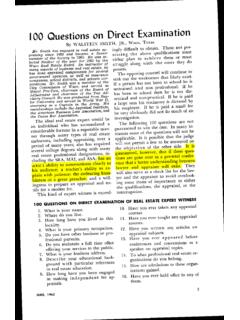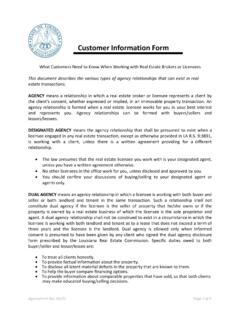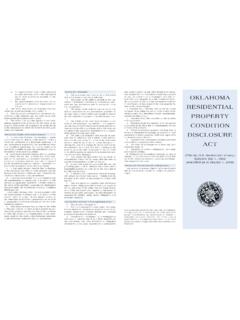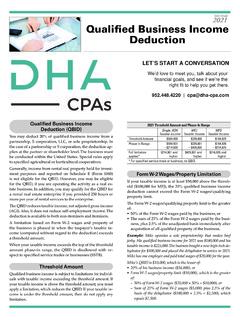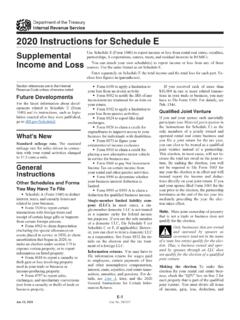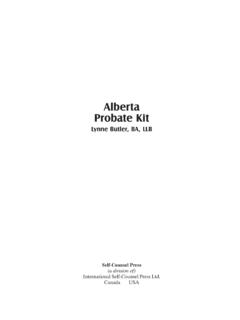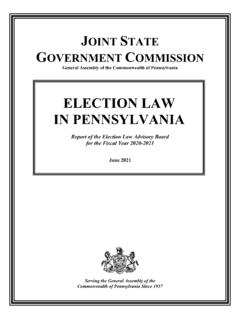Transcription of Estate Tax deductions - Gudorf Law Group, LLC
1 101 Estate Tax deductionsste Ven b. spe WaK ( st. lou s, m ssour )when you die, it is likely that those charged with administering your final affairs will have responsibility for paying, from your Estate or revocable trust, a variety of costs, expenses, and other financial obligations on your behalf. These may include your funeral expenses, debts you owe at your death, and expenses required to administer your Estate . The good news is that these expenses are deductible on your es-tate tax return, which in turn, can produce Estate tax savings for your family.
2 The even better news is that if you do not owe an Estate tax at your death, many of these expenses can instead be taken as income tax deductions , thereby translating into income tax savings for your family. However, it is important that those who administer your Estate understand these rules in order to obtain the tax savings are four types of expenses that qualify as Estate tax deductions . They are:funeral expenses. Examples include funeral and cemetery charges and payments to officiating expenses.
3 Costs incurred to administer your final affairs are also deductible for Estate tax purposes. These deductible expenses include accounting fees to prepare your final income tax return, income tax returns for your Estate or trust, and your Estate tax return, if necessary. They also include attorney fees, executor fees, trustee fees, and probate costs necessary to administer your property and affairs. Finally, administration expenses include other miscellaneous expenses, such as appraisal fees, and expenditures to maintain property in good condition prior to distribution to Claims are amounts you owe at your death that your Estate is legally obligated to pay.
4 They include items such as final utility bills for the month in which you die, credit card balances owed at your death, and any other financial obligations you have incurred but which are still unpaid at your death. They also include any income taxes due for income you earned in the year of your Any indebtedness secured by a mortgage on real Estate you own at your death also qualifies for an Estate tax deduction . For example, if you die with aChapter 2710 WealthCounsel Estate planning strategies$100,000 mortgage on your home and an additional home equity loan of $25,000, a deduction of $125,000 can be taken on your Estate tax addition to deducting the foregoing expenses, any casualty losses.
5 Such as theft losses or losses resulting from a fire or flood occurring during the administration of your Estate not otherwise compensated by insurance are deductible for Estate tax biggest impediment in making use of Estate tax deductions is that for the majority of people who die, no Estate tax is due regardless of whether Estate tax deductions are claimed. This occurs for two reasons. First, if you are married when you die and leave your Estate to a surviving spouse, there is no Estate tax due regardless of the size of your Estate because of the unlimited marital deduction .
6 Second, if the value of your Estate is less than the amount of the Estate tax exemption in the year of your death, no Estate tax will be due. For example, for persons dying in 2009, the amount of the Estate tax exemption is $ million. Therefore, if you die that year with an Estate less than that amount, there is no Estate fact that no Estate tax is due does not mean your family cannot benefit from Estate tax deductions , because the portion of your Estate tax deductions that qualify as administration expenses, if not deducted on an Estate tax return, may be deducted on the income tax return for your Estate or revocable trust during the administration of your Estate or revocable trust.
7 In addition, medical expenses incurred by you prior to your death paid within one year of your death may be deducted on your personal income tax return for the year in which you incurred those expenses if they are not deducted on your Estate tax examples that follow will help clarify how your family can best benefit from your available Estate tax enario 1: At the time of your death, you are not married, and your Estate has a value of $ million. The Estate tax exemption at that time is $ million and the Estate tax rate is 45%.
8 Your Estate is entitled to the following Estate tax deductions :funeral b ll $ ,000 Cred t card balances ,000other debts ,000appra sal fees ,000executor and trustee fees 10,000account ng fees for ncome and Estate tax return preparat on 10,000attorney fees 10,000total deductions $44,000 Since the Estate tax rate in this example is 45%, taking $44,000 in deductions on your Estate tax return saves your family $19,800 in Estate taxes ($44,000 x 45%).10 sC enario 2: The facts are the same as in Scenario 1 except that you are married at the time of your death.
9 If your Estate plan took advantage of the unlimited marital deduction , there is no Estate tax due even though the gross value of your Estate exceeds the exemption amount. Therefore, no tax benefit would result by claiming your Estate tax deductions on an Estate tax return. However, those Estate tax deductions that qualify as administration expenses can be deducted on your Estate s income tax return. In our example, all expenses other than the funeral bill, credit card balances, and other debts qualify as administration expenses.
10 These administration expenses total $32,000. If your Estate is in a 33% income tax bracket and these are taken as deductions on the Estate s income tax return, your family will save $10,560 in income taxes ($32,000 x 33%).sC enario 3: At the time of your death, your Estate has a value of $1 million, and the Estate tax exemption is $ million. Whether or not you are married, there will be no Estate tax due because the exemption is greater than the value of your Estate . As in our prior example, there would be no tax benefit by claiming your Estate tax deductions to reduce your Estate tax.
